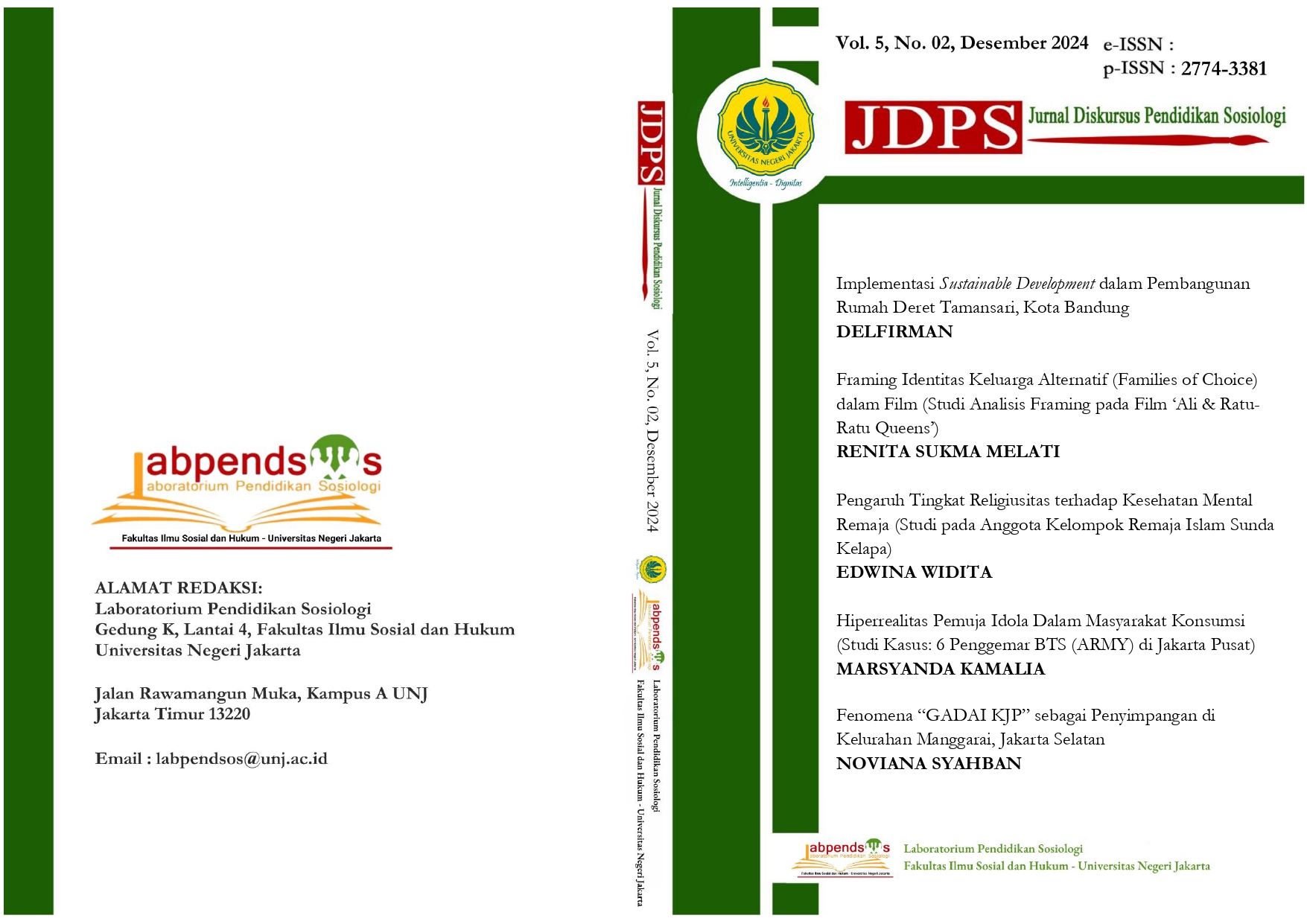Hiperrealitas Pemuja Idola Dalam Masyarakat Konsumsi (Studi Kasus: 6 Penggemar BTS (ARMY) di Jakarta Pusat)
(Studi Kasus: 6 Penggemar BTS (ARMY) di Jakarta Pusat)
Keywords:
idol worship, hyperreality, popular culture, fandom, ARMY, BTSAbstract
This research aims to describe the behavior of BTS (ARMY) fans, forms of hyperreality and the impact of idol worshipers' hyperreality in consumption society. The subjects of this research were six informants, namely K-Pop fans in the ARMY fandom. The data in this research was obtained through observation, in-depth interviews, documentation and literature study. Data triangulation was carried out by reconfirming the data with the informant from the social media uploads of the informant, family and close friends of the informant. The results of this research show that fan behavior in idol worship is listening to music, consuming content and activities of idol artists, streaming and voting, bringing fan accessories, buying K-Pop merchandise or goods, also watching or attending K-Pop concerts and events. Fans' behavior towards K-Pop culture has a big influence on fans' attraction to Korean culture at large, one of which is fans' interest in learning Korean. There is a form of hyperreality that leads fans to excessive worship, where fans spend a lot of time, energy and money to pursue an image and lifestyle in order to be closer to their idol artists. Hyperreality also results in a shift in the logic of fan reality and the culture that fans consume. Finally, the social impact that arises is having the desire to have business opportunities, save money, discover one's interests and talents and be able to empathize with one's own mental health, and the negative impact of idol worship is the emergence of fanaticism and a consumerist lifestyle.
Keywords: Idol Worship, Hyperreality, Popular Culture, Fandom, ARMY, BTS
References
Aufa, R., Mar'at, S., & Tiatri, S. (2019). Peranan cognitive flexibility, self-esteem, dan loneliness terhadap celebrity worship pada remaja. Jurnal Muara Ilmu Sosial, Humaniora, dan Seni, 3(2).
Barker, Chris. 2005. Cultural Studies: Teori dan Praktik. Edisi Kedua. Yogjakarta: Bentang Pustaka.
Baudrillard, Jean. 2001. Galaksi Simulacra, Terj. M. Imam Aziz. Yogyakarta: LkiS.
El Farabi, Q. N. S. (2020). Motivasi Penggemar K-Pop sebagai Citizen Author Menulis Fan Fiction. Ultimacomm: Jurnal Ilmu Komunikasi, 12(1), 34-52.
Fachrosi, E., Fani, D. T., Lubis, R. F., Aritonang, N. B., Azizah, N., Saragih, D. R., & Malik, F. (2020). Jurnal Diversita. 6(2).
Gary G, H., Donald Fels. 2010. Handbook of cultural sociology:Chapter XI Global cultures, global processes: Consumerism and self-representation in an era of global capitalism. London: Routledge.
Iskandar. 2009. Metodologi Penelitian Kualitatif, Jakarta: Gaung Persada.
Kusumastuti, A., & Khoiron, A. M. 2019. Metode penelitian kualitatif. Lembaga Pendidikan Sukarno Pressindo (LPSP).
Lee, H. K., & Zhang, X. (2021). The Korean Wave as a source of implicit cultural policy: Making of a neoliberal subjectivity in a Korean style. International Journal of Cultural Studies, 24(3), 521-537.
Maulida, A., Viridanda, W. Y., Nisa, H., & Sari, N. (2021). Tingkat Pemujaan Selebriti pada Komunitas Penggemar K-pop di Aceh. Seurune: Jurnal Psikologi Unsyiah, 4(1), 48-74.
McCutcheon, L. E., Zsila, Á., & Demetrovics, Z. (2021). Celebrity worship and cognitive skills revisited: applying Cattell’s two-factor theory of intelligence in a cross-sectional study. BMC psychology, 9(1).
Mohd Jenol, N. A., & Ahmad Pazil, N. H. (2022). “I found my talent after I become a K-pop fan”: K-pop participatory culture unleashing talents among Malaysian youth. Cogent Social Sciences, 8(1).
Nisrina, D., Widodo, I. A., Larassari, I. B., & Rahmaji, F. (2020). Dampak konsumerisme budaya Korea (Kpop) di kalangan mahasiswa fakultas ilmu sosial universitas negeri Malang. Jurnal Penelitian Humaniora, 21(1), 78-88.
Purwanti, S. (2013). Korea, remaja dan proses peniruan. Psikostudia: Jurnal Psikologi, 2(1), 28-36.
Putri, K. A., Amirudin, A., & Purnomo, M. H. (2019). Korean Wave dalam Fanatisme dan Konstruksi Gaya Hidup Generasi Z. Nusa: Jurnal Ilmu Bahasa dan Sastra, 14(1), 125-135.
Ritzer, George. 2010. Teori Sosial Postmodern, Terjem. Muhammad Taufik, Yogyakarta: Juxtapose dan Kreasi Wacana.
Storey, John. 2015. Dalam Post-Modernisme: Jean Baudrilliard, Cultural Theory and Popular Culture. London: Routledge.
Storey, John. 2015. Dalam Whats is Popular Culture: Popular Culture, Cultural Theory and Popular Culture, London: Routledge.
Suryani, A. N. (2019). Bangtan Sonyeondan (BTS) as new American idol. Rubikon: Journal of Transnational American Studies, 6(1), 28-54.
Williams, J. P. (2016). Negotiating fan identities in K-Pop music culture. In Symbolic Interactionist Takes on Music (pp. 81-96). Emerald Group Publishing Limited.

Downloads
Published
How to Cite
Issue
Section
License
Copyright (c) 2024 Marsyanda Kamalia

This work is licensed under a Creative Commons Attribution-NonCommercial-ShareAlike 4.0 International License.
- Authors retain copyright and grant the journal right of first publication with the work simultaneously licensed under an Attribution-NonCommercial-ShareAlike 4.0 International (CC BY-NC-SA 4.0) that allows others to share the work with an acknowledgment of the work's authorship and initial publication in this journal.
- Authors are able to enter into separate, additional contractual arrangements for the non-exclusive distribution of the journal's published version of the work (e.g., post it to an institutional repository or publish it in a book), with an acknowledgment of its initial publication in this journal.
- Authors are permitted and encouraged to post their work online (e.g., in institutional repositories or on their website) prior to and during the submission process, as it can lead to productive exchanges, as well as earlier and greater citation of published work.

.png)
.png)
.png)
1.png)










